Sirius Building
The Sirius building is an apartment complex in The Rocks district of Sydney, New South Wales, Australia. Designed for the Housing Commission of New South Wales in 1978–1979 by commission architect Tao Gofers, the building is a prominent example of Brutalist architecture in Australia. It also has striking repetitive geometries in reaction to the Japanese metabolist architecture movement. Notable for being the only high rise development in The Rocks, Sirius housed 79 apartments with one, two, three or four bedrooms, generally with single storey apartments to two and three storey walk ups.[1] The complex was built to rehouse displaced public tenants after a controversial redevelopment of the Rocks during the 1960s and 70s.
| Sirius | |
|---|---|
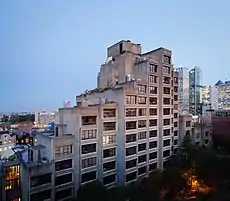 Sirius | |
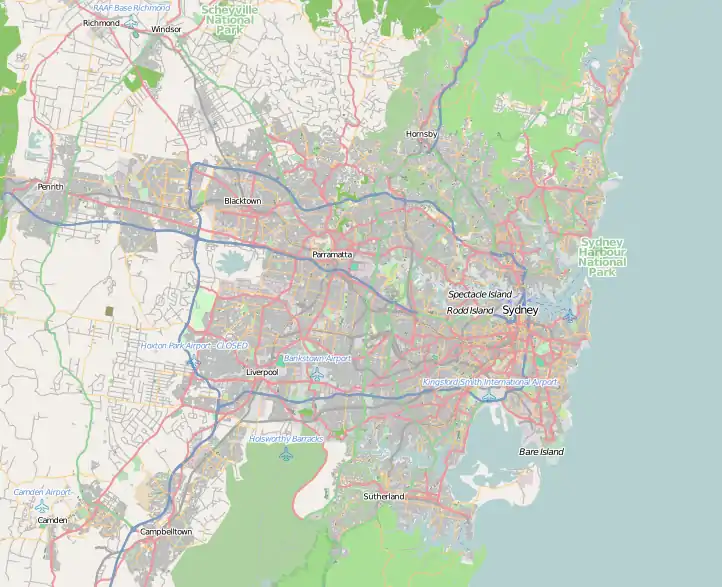 Location within Sydney | |
| General information | |
| Status | Completed |
| Type | Housing |
| Architectural style | Brutalist |
| Location | 38 to 70 Cumberland Street, The Rocks, Sydney |
| Country | Australia |
| Coordinates | 33.8577°S 151.2079°E |
| Named for | Sirius HMS Sirius |
| Completed | 1980 |
| Opened | 16 May 1981 |
| Client | Housing Commission of NSW |
| Owner | Property NSW |
| Height | varies from one to twelve storeys |
| Technical details | |
| Structural system | Concrete frame & precast concrete sections |
| Design and construction | |
| Architect(s) | Theodorus (Tao) Gofers |
| Other information | |
| Number of units |
|
From 2015, the Sirius building was at the centre of controversy over plans to remove the residents, sell off the building and possibly redevelop the site, with opponents of the plans seeking to secure its protection as a heritage building. Following the NSW Government's decision to refuse heritage listing in 2017, against the advice of the Heritage Council of New South Wales, the building was put up for sale.
In 2018 the building won the Enduring Architecture Award from NSW Australian Institute of Architects. [2]
Design
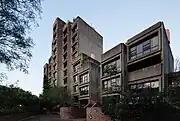
The complex was built to rehouse public tenants who had been displaced after a controversial redevelopment of the historic Rocks suburb during the 1960s and 70s.[3] The building housed many of the original residents who fought for their right to remain in the area during the famous Green bans, whose purpose was not to retain heritage buildings but rather to retain the working class community in The Rocks. Many of the buildings remain, but the majority of the residents were moved into the Sirius apartments in the so-called 'people's plan'. The terraces and town houses they used to call home are owned by the Sydney Harbour Foreshore Authority (SHFA), who receive rent from the tenants living in the building.
Sirius is among the few quality examples of the Brutalism style in Australia, demonstrating the style's objective of ethical design based on social concerns, as well as its focus on the truthful expression of materials, function and structure.[4] Designed by Housing Commission architect, Tao Gofers, Sirius was based on Gofer's other major project for the Housing Commission: The Laurels, a public housing development in southern Sydney's Sans Souci. Like that development, Gofers’ original plan was to finish the building in a white colour to match the nearby Sydney Opera House, but due to budget constraints, the building was finished unpainted.[5]
Anecdotally, unit 74 of the Sirius building became somewhat of an unofficial Sydney landmark; its sign displaying ‘One Way! Jesus’ clearly visible to Harbour Bridge commuters.[6] The sign was in place for around 10 years, although the owner of the sign, Owen McAloon, and his motivations to spread a Christian message remained generally unknown.[7]
The Deutsches Architekturmuseum (DAM) in Frankfurt has included Sirius in #SOSBrutalism, a growing database that currently contains over 700 Brutalist buildings. Importantly, #SOSBrutalism is a platform for a large campaign ‘to save our beloved concrete monsters’. The buildings in the database marked red are in particular jeopardy. There are few Australian entries in the project, but Sirius is at the top of the list of the world's endangered Brutalist buildings.[8]
Decisions about the building's future
A decision to sell the building was made in 2015 by the Baird Coalition government, thereby placing it under risk of demolition due to a lack of any heritage protection.[9] The NSW Heritage Council recommended heritage listing for the building in 2016, but this was denied by the Heritage Minister, Mark Speakman.[4][10][11][12] The Land and Environment Court of New South Wales was advised in a hearing that redevelopment would affect views of the Sydney Opera House, a World Heritage Site, as well as "impinge on the Rocks' low-rise heritage, wharves, sandstone buildings and Victorian terraces".[13]
In July 2016 Speakman announced that the building would not be heritage listed "despite a unanimous recommendation by the Heritage Council", citing the loss of financial return as a consequence of listing as the reason.[14][15] The Sirius building is included on the World Monuments Fund's 2018 list of monuments at risk, with the listing calling "on the government of New South Wales to respect the recommendation of its heritage experts and allow its citizens to maintain an important social legacy".[16][17]
In July 2017, the Land and Environment Court ruled the decision by the state’s then-heritage minister Mark Speakman not to place the Sirius public housing complex on the State Heritage Register was “invalid and of no legal effect.” The court determined the government’s claim of financial loss did not constitute “financial hardship” and that the minister failed to consider the building’s heritage significance in his decision. The court ordered the Minister for Heritage (Gabrielle Upton at the time of the ruling) “to make a decision either to direct or not to direct the listing of the Sirius Apartment Building [...] according to the law".[18][19] In October 2017, Upton again refused to list Sirius on the state heritage register, noting "In my view, [Sirius] is not a landmark worthy of State heritage protection."[20][21]
The last remaining resident was Myra Demetriou, who in 2017 was 90 and legally blind.[22] Efforts to move the last residents were made to accommodation described as "unsuitable".[23] Demetriou moved out as the last resident on 1 February 2018.[24]
Public support
The S.O.S. (Save Our Sirius Foundation)[25] was formed by people and organisations campaigning to save Sirius and its residents and is supported by the National Trust of Australia, the Australian Institute of Architects, the Millers Point Residents Action Group, Friends of Millers Point, Millers Point Public Housing Tenants Group, Unions NSW, CFMEU, and Jack Mundey, the Green Ban campaigner who helped save The Rocks from redevelopment in the 1970s. Previous NSW chapter president of the Australian Institute of Architects, Shaun Carter, is chairman of the Save Our Sirius Foundation. Carter has argued that any decision about the building should take account of its social, cultural and environmental significance.[10]
A set of "S.O.S." lights flashed over The Rocks and Circular Quay from the top floor of Sirius when they were first installed to coincide with the exhibition S.O.S. Save our Sirius on 2 November 2014.[1] Resident McAloon's sign was briefly replaced by lights flashing S.O.S. to the Harbour Bridge traffic, but this was soon 'confiscated' by Housing NSW and McAloon 'relocated' by Housing NSW.[26]
Other supporters of the building include Sydney Lord Mayor Clover Moore, state member for Sydney, Alex Greenwich, and the Australian Labor Party. Anthony Albanese described the Sirius building as "not just a place people call home, but a symbol of inclusion", while the local member for Sydney, Tanya Plibersek called the government's decision to sell "heartless".[14][24] The S.O.S Foundation suggested that Sirius could be saved if Lendlease were to purchase the building and develop some of its apartments for social and affordable housing.[22] When Lendlease announced they would not be making a bid for the building, the foundation announced its intention to assemble a bid.[24]
Various public protests supported the inclusion of the building on the State heritage Register, including a petition, a crowd funded legal challenge, whose organisers aim to have the Minister's decision annulled;[27][28][29] a rally;[15] and a green ban announced by the Construction Forestry Mining & Energy Union (CFMEU), under which no company associated with union will be involved with any proposed demolition of the building.[15]
Purchase
On 28 June 2019, the NSW government announced that Sirius would be refurbished rather than demolished. The NSW Housing Minister, Melinda Pavey, announced that the building had been sold for A$150 million to Sirius Developments Pty Ltd, which was owned by private investment firm JDH Capital, subsequently identified as a shell company for Sirius Developments, set up for the deal by Jean-Dominique Huynh, and apparently without the requisite experience delivering a project "of a similar scale".[30][31] It is intended that the building will be redeveloped into 76 apartments, plus retail and commercial spaces.[32] The proceeds of the sale are expected to provide social housing for around 630 people.[33] On release $435 million worth of apartments were sold by developer JDH Capital in one weekend at a rate of $118,000 per square metre.[34]
Redevelopment
The major 2022—2023 refurbishment and significant changes to the built form are being undertaken by BVN Architecture, 360 Degrees Landscape Architects and Kelly Hoppen (Interiors) with construction by Richard Crookes Construction.[35] Branding and marketing collateral was prepared by Hoyne.[36]
Book
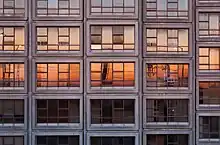
In 2017, a book by John Dunn, Ben Peake and Amiera Piscopo documenting the story of the building and its residents was published by Piper Press. The cover features an image of the building's facade at sunset by Katherine Lu.[37]
Gallery
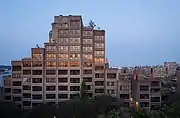 Sirius western elevation viewed from Cumberland St
Sirius western elevation viewed from Cumberland St Sirius shared courtyard
Sirius shared courtyard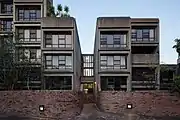 Sirius low rise entry
Sirius low rise entry.jpg.webp) From Circular Quay
From Circular Quay.jpg.webp) From Avery Terrace
From Avery Terrace.jpg.webp) From East
From East.jpg.webp)
.jpg.webp) Building signage
Building signage
References
- "Sirius". Millers Point. Millers Point Newsletter.
- "Sirius Wins 2018 Enduring Architecture Award from NSW Australian Institute of Architects". Save Our Sirius.
- Pickett, Charles (8 May 2013). "Sirius on The Rocks". Retrieved 11 June 2013.
- Farrelly, Elizabeth (6 August 2016). "The brutal truth: we're trashing Sydney's heritage". The Sydney Morning Herald. Retrieved 6 August 2016.
- Bleby, Michael (11 November 2016). "Tao Gofers, the closet showman behind Sydney's Sirius building". Australian Financial Review. Retrieved 13 April 2018.
- Brewster, Anthony (8 May 2014). "The man behind the most famous sign seen from Sydney's Harbour Bridge". The Guardian. Retrieved 5 August 2016.
- Dawson, Matt (11 October 2013). "Looking for the man behind the sign". Precinct News. UTS Graduate School of Journalism. Retrieved 6 August 2016.
- "#SOSBrutalism". #SOSBRUTALISM. Retrieved 7 August 2016.
- Johnson, Nathan (2 August 2016). "Gone: Sydney's Sirius apartments face demolition after heritage push fails". Architecture & Design.
- Hoh, Amanda (1 August 2016). "Sirius building's denial of heritage listing, proposed demolition a 'cultural tragedy', artist says". ABC News. Retrieved 7 August 2016.
- McNally, Lucy; Code, Bill (19 February 2016). "Heritage listing push for Sydney's iconic Sirius building". ABC News. Retrieved 6 August 2016.
- "No heritage listing for Sirius Building". Office of Environment and Heritage. NSW Government. 31 July 2016. Retrieved 23 September 2016.
- Robertson, James (2 November 2016). "Sirius redevelopment would put Opera House views at risk, architects say". The Sydney Morning Herald. Retrieved 2 November 2016.
- Kembrey, Melanie (18 September 2016). "'We're very lucky here': Inside Sydney's Sirius Building". The Sun-Herald. Retrieved 22 September 2016.
- Keoghan, Sarah (14 September 2016). "Unions block Sirius demolition as protests ramp up". The Daily Telegraph. Retrieved 23 September 2016.
- "Sirius Building". 2018 World Monuments Watch. World Monuments Foundation.
- AAP (17 October 2017). "Sydney's Sirius building recognised by World Monuments Fund". The Sydney Morning Herald. Retrieved 13 April 2018.
- Saulwick, Jacob (25 July 2017). "The Sirius building to remain standing after court rules against NSW government". The Sydney Morning Herald. Retrieved 30 July 2017.
- NSW Caselaw. "Millers Point Community Assoc. Incorporated v Property NSW [2017] NSWLEC 92". NSW Caselaw. Retrieved 27 July 2017.
- Cheng, Linda (26 October 2017). "Sirius denied heritage protection, again". ArchitectureAU. Retrieved 13 April 2018.
- Robertson, James (25 October 2017). "Sirius demolition one step closer as state government declines to grant heritage status". The Sydney Morning Herald. Retrieved 13 April 2018.
- Sanda, Dominica (7 June 2017). "Push to save Sirius, Sydney's controversial brutalist landmark". The Sydney Morning Herald. Retrieved 20 July 2017.
- "Last residents hold firm in brutal world". The Sydney Morning Herald. 7 May 2017. p. 10.
- Cockburn, Paige; Laurence, Emily (27 January 2018). "Sirius building: Last resident Myra Demetriou farewelled, campaigners to make bid to buy". ABC News. Retrieved 13 April 2018.
- "SAVE OUR SIRIUS".
- Brewster, Anthony (8 May 2014). "The man behind the most famous sign seen from the Sydney Harbour Bridge". The Guardian Australia. Retrieved 5 July 2014.
- "Save Our Sirius". Save Our Sirius.org. 27 August 2016. Retrieved 29 August 2016.
- "Save Our Sirius". Save Our Sirius Foundation. 23 August 2016. Retrieved 23 August 2016.
- Fuary-Wagner, Ingrid (20 August 2016). "Hundreds of supporters gather in fresh bid to save Sydney's famous Brutalist building Sirius". The Sydney Morning Herald (Domain). Retrieved 22 August 2016.
- Fellner, Carrie (5 July 2020). "Sirius Building's $150m mystery buyer linked to Vietnamese billionaires". The Sydney Morning Herald.
- Fellner, Carrie (6 July 2020). "'Fraud and forgery': Fireworks over Sirius buyer's development attempt". The Sydney Morning Herald.
- Visentin, Lisa (28 June 2019). "Sirius building to be refurbished as NSW government nets $150 million in sell-off". Retrieved 26 July 2019.
- Kontominas, Belinda (28 June 2019). "Sydney's iconic Sirius building sold to developers for $150 million". ABC News.
- "Sirius". Hoyne. 2023. Retrieved 12 October 2023.
- "Sirius Sydney Harbour Team". Sirius Sydney Harbour. 2023. Retrieved 12 October 2023.
- "Sirius". Hoyne. 2023. Retrieved 12 October 2023.
- Dunn, John; Peake, Ben; Piscopo, Amiera (2017). Sirius. Sydney: Piper Press. ISBN 9780980834758.